I am not a hearty traveler. “If you were a farm animal, you would have been put down,” quipped my husband. Between the food poisoning and the vertigo, the garden variety infections and anxiety, I’d have to agree.
Despite distressing health, I was able to make a few observations and take a lot of pictures during the 17-day trip to mainland China and Hong Kong with my parents and 30 other tour group members.
First of all, I must report – China is HUGE (cue a certain special voice – just right for what I’m trying to convey). Its population is 1.3 billion, compared to our 323 million, and honest to God you can feel it. We visited two cities that each count over 23 million residents – Shanghai and Beijing – and the skyscrapers stretched up and away as far as the eye could see. China’s definition of a small city? “5 to 10 million” was the figure I heard! Often laundry hung on racks on balconies: it is common in urban China to have a washer in your home but no dryer. Right away you’ve got this striking contrast between an intensely urban environment and something that looks rural in American eyes.
The very nice, state-approved hotels we stayed in also featured some odd contrasts. The lobby would be a vision of marble and jade, but then the room would shock a Western sensibility. You couldn’t drink the water from the tap, and quite often there would be mold on the shower curtain or in the tile grout. WHAT? If I were in business I might set about introducing Tilex to the masses. Or at least the hotel owners.
I chatted at some length with one small businessman, Byung, who operated the gift shop on Yangtze River cruise ship we lived on for several days and nights. We talked about some of the differences between the U.S. and China. “Does your husband have to feed you?” he asked. Yes, I told him (squirming a bit), my husband does have to feed me, but he has never been responsible for the daily care and feeding of his own parents. Byung admitted that he had to work very hard to support both his own wife and child and his parents. We agreed that life is harder for a man in China.
I’m not sure how he met his wife – didn’t come up – but one tour guide was very forthcoming about her arranged marriage, no longer common in Chinese cities. She grew up in the country in an ethnic minority, and she wanted her mother to choose her husband. “I trust my mother to make the right choice for me,” she told us. “It has been 6 years, so far so good, but you know what they say about 7 year scratch!” she laughed. She was the second daughter born in her family during the time of China’s one-child policy. The family had to pay a fine equivalent to $100 when she was born. When the family had their third child, another girl, both parents were fired from their jobs in the city. At that point, the family had no choice but to return to the countryside and farming. Our guide didn’t seem bitter about this, though she did say that they were sometimes short of food and that the hours on the farm were long. “Now, changes for better,” she said. (China moved to a two-child policy last year.) She herself has moved back to the city and has a good job as a teacher and part-time tour guide. Her son is in kindergarten.
We’ve all heard a lot about the preference for baby boys in China. That ideal seems to be in flux. The historical reason for the preference is that boys are expected to care for their parents – and usually live with them – until the parents die. The other part of that equation is that parents are expected to pay for both a home AND a car for male children when they grow up! Yes, you heard that right. The parents buy the son his first home. The consistent message from our tour guides was that parents are relieved when they have a girl these days. “Boys are too expensive,” they said, universally. It seems to me that things are very much in flux right now. One tour guide, for instance, is living with his wife’s parents, not his own. That is a significant break from tradition. It seems that urban sons and daughters are renegotiating the rights and responsibilities among the generations, at least to some extent. In the meanwhile, we were told that the ratio of young men to young women in China is a startling 6 to 1. (I’m not sure this figure is precisely right… you can find a lot of different ways to slice and dice the numbers online, but the essential fact all agree on is the HUGE gender imbalance.)
China, it seems to me, gets a lot of things right. The emphasis on intergenerational family responsibility and love is admirable. Same with the emphasis on balance, yin and yang, in all things.
Not so right: the pollution that is literally in your face. Sometimes I felt that I was living in a permanent cloud, a morning fog that never burned off.
It was even more unsettling not to have access to Google – including gmail – or Facebook, a daily reminder that the government prevents its citizens from having access to the larger world of ideas and social connections.
Today’s post features a photo essay on some of the differences and similarities between China and the U.S.
* * *
Some days, I noticed how alike our countries are. In both places, for instance, you can find ladies wearing hats in the sun while floating down the river:
You find strange business names in China, just as in the States:
You find Coke and bacon, mainstays of civilization everywhere:
And it almost goes without saying that the tea was brilliant (no troublesome Brit suggesting that you ruin it with milk or sugar).
More often, China startled me with its differences.
Motorbikes, motorized carts and bicycles share their own busy lane on the roads. It seemed standard practice to travel by motorbike with your child. Without a helmet. On anyone.
From bullet trains to wooden boats to airplanes, transportation choices varied spectacularly:
Here are some more things I saw in China that you don’t see in the U.S. at all:
“Square dancing” for retirees in the public parks every morning (women only), with ballroom dancing nearby (men included):
Street sweepers using brooms like this:
Women washing clothes in the Yangtze River:
A cricket master:
The Emperor of heaven, in a temple near the Red Pagoda:
Women’s toilets are deeply distressing, and this style is predominant even in the biggest tourist attractions and huge upscale malls:
They are enough to make anyone feel like this:
Public signs accurately reflect Chinese culture. Some signs are bossy and controlling:
While others are profound:
A few of the most remarkable sights in China included:
The Three Gorges Dam, the world’s largest hydrolectric power project, and
fireworks on a city street during the country’s Autumn festival. Literally, on the street, as we came out of a restaurant:
Most adorable prize goes to either the baby panda…
Though Shanghai has been called the pearl of China, its most beautiful city, I’m sticking with Hong Kong.
Here are the books I’ve been reading to understand more, and I’ll post reviews in the coming weeks:
* * *
Our warm, smart tour guide, Oscar, taught us a great deal about Chinese history, current affairs, and daily life, and served as a very capable mother hen. The 32 of us in the group hailed predominantly from New York, New Jersey, Florida and California (my parents and I, representing the South, were the outliers). One beautiful family group with origins in Puerto Rico traveled as a group of eight. Two other couples – kind-hearted sisters with their kind-hearted husbands – hailed originally from the Philippines. One of the Shirleys, from Minnesota and Jewish, taught me to say kenahora to keep away the evil spirits. Kathy kept an eye out for everyone and shared her dried hawthorn berries. Ralph and I compared notes on our digestive difficulties, while the 70-year-old honeymooners were much in love. My parents inspired me with their intellectual curiosity and fortitude every day. If I were a novelist, I might write a book about this group of strangers thrown together for 17 days and the small world they created.

















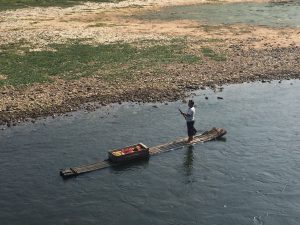



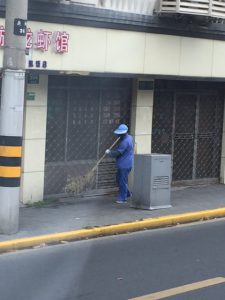

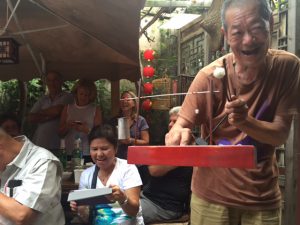




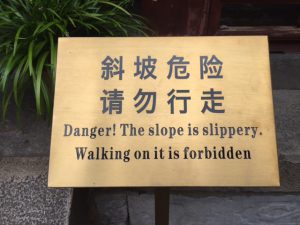
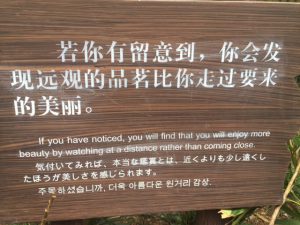













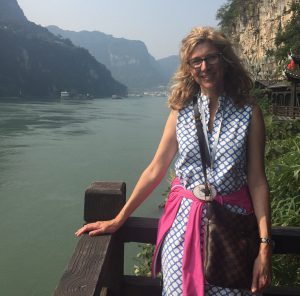












Wonderful review of our trip to China! It was awesome that you joined the SmarTours group. I could hardly wait for you to post this!
I loved the tour, and especially the time with you and Dad! xo
What a fascinating and informative travelogue. Thank you for taking us with you!
I’m so glad you enjoyed it, Barbara! One of the great pleasures of the trip for me was taking notes and thinking about this post! xo
What an experience. So glad you shared it.
I’m awfully glad to be home but yes it was quite an experience!! Thanks, Ridley. xo
I absolutely love this post. I appreciate this post! I am inspired by this post!!! Thank you!!
Dear Betsy – thank you! You are the inspiring one, always! I’m so happy you enjoyed this. xo
Love this post and your travel insight!
Thank you so much, Katie! I hope to see you soon! xo
I felt like I was there with you! Thanks for sharing
What a nice compliment! Thank you, Jane! xo
Wonderful post with great photo illustrations! Welcome home!
Thank you so much, Carolyn! xo
Thanks, Jennifer, for sharing your travel story; it was so interesting to read a completely different view of such a mysterious country to me. Love the photos and the captions and your fellow travelers looked like fun!
I had been to Hong Kong before and thought I knew what to expect. Mainland China is an entirely different place and – as for you – more mysterious. xo
Love reading about your trip and observations! It is still mind bending for me to try to wrap my thoughts around all the differences between being a woman in the US vs China. it certainly pulls one out of oneself to travel to places that aren’t always “comfortable” or familiar, and that was my experience in China as well. Welcome back!
We’ll have to compare notes, Barby! And despite the difficulties, this trip did remind me of exactly what you said about experiences outside your comfort zone (which you can find in Nashville as well of course). xo
Really enjoyed this! To your credit you picked a really
hard place to travel. I don’t think I could have made that trip to China and I’m currently living in Bhutan 🙂
Laughing! Linda, I have no doubt you would have been a happy, hearty traveler! But thank you!! xo
I loved your travelogue, Jennifer. Thanks for sharing! I loved the photos and commentary on similarities and differences. And, so sorry about your digestive troubles; that can change the outlook of a trip indeed. Looking forward to your book reviews!
Thank you so much, Christi! Oh my goodness it kind-of scared me to death being sick that far away, and really outside the reach of western medicine when we were in the interior of the country. The ship’s doctor (trained in Chinese medicine) gave me a herbal remedy which I was desperate enough to try and it did seem to help! xo
Wonderful post, so descriptive, have been there and loved landing in the USA, we are so fortunate.
Thank you, Mike! I loved being there but – like you – also loved coming home. xo
What a wonderful (and honest) travel post! Thanks for taking your readers on this voyage — looking forward to hearing your reaction to the China books — how they shaped your perception of the country and whether Kissinger’s book still rings true.
The books are incredible. I’m only about 1/3 of the way into the Kissinger and it’s maybe a little heavier going than the others but still so engaging… full report soon! I’m so glad you enjoyed the post, and I look forward to hearing from you very soon! xo
I’m so sorry about your health issues, but so glad to read your dispatch from a place I want to visit. The description of your fellow travelers is charming, and makes me reconsider my aversion to tours.
In some ways I learned as much about America as I did about China from the various fellow travelers! It’s wonderful how friendship will grow in this kind of setting. Thanks, Lou Ann, xo
What a wonderful post…and great photos! Thank you for sharing your experience!
Hi Laura! I’m so happy you enjoyed the post! Having this to work on while I was abroad helped me summon my courage when I was feeling low. xo
What a grand adventure, Jennifer! I heartily endorse a novel about your fellow travelers and their escapades.
The only thing that would have made the group more interesting is a murder. 🙂 Too friendly of a group for that, thank goodness! Of course in my novel, I could add one… xo
Thank you for sharing your trip with us. So many concepts and ideas expressed in a concise and engaging manner.
I’m afraid I might not have achieved “concise,” but I so appreciate “engaging”!! xo
Wow! What an amazing trip – you have now seen more of China than I have It’s also funny that a lot of things that you mention in your post….I have just learned to take for granted over the years and “forgot” how different it still is. Did you notice how short the Chinese sentences are? The signs are all in 4 character phrases. A lot can be said with few words. It’s a very efficient language! I am inspired by you to work harder in organizing our next family trip back to China…maybe I will invite you to come as my tour guide
Hi Victoria! I would go back in a heartbeat!! How fascinating about the characters… I didn’t think about it until you said something. Each character is loaded up with meaning. I had moments of feeling very inspired myself to try to learn the language – followed in short order by the feeling that I am way too old for that. Ruth is still pursuing her Chinese; I suspect I’ll lean on her. I’m so happy to hear from you!! xo
Welcome back! I loved to read your perspective of China. Thank you for sharing it! My grandfather (my mom’s father) taught English there in 1923. My mother says that he sent a trunk of things he purchased c/o his mother’s address and told her not to open it. She couldn’t resist, and gave away most of the things to other family members before he returned. My mom says that my grandfather never forgave her for that! A handful of things were salvaged though, and a few have been passed along to me. My parents went to China several years ago; my mom wanted to see the Terracotta army because she remembers a photo that my grandfather had taken of it and she was fascinated. I know that my mom got her adventurous travel spirit from him. He died when I was 12, but I wish I could have had a conversation with him about his travels. Your blog will serve as a wonderful memoir for your grandchildren someday!
I’m thinking of Pandora’s Box… it is hard for mysterious boxes to stay closed, in all times and places. I’m so glad a few of the items made it into your hands! It’s neat that your mom got to see something she had remembered from a photo of her father’s made so many years before. We saw the terra cotta army as well! Thank you for your kind words about the blog; I do wonder whether this kind of digital record survives or whether it becomes papyrus. Thank you so much for being in touch, Alicia! I loved hearing about your family’s history in China. xo
Thanks for sharing Jennifer…this brings back memories from our trip to China a few years ago. Can’t wait to hear more over coffee
I look forward to coffee as well and hearing your impressions! Thanks, Sandra! xo
Jennifer, I really enjoyed your travel memoir! It made me nostalgic as I had the unbelievable experience of going to China in 1976 (Mao was still alive) with a group of 20 high school students from all over the US. We were the first invited student tour and were guests of the government. So much has changed over the years, except perhaps the hotels, and it was fun to read about your experiences. Best, Tari
Tari, that is absolutely amazing! I have to hear more about this! xo
I’ve been reading this travelogue in bits and pieces. As I’ve only been to China once (a few months before the Hong Kong handover to China AND during martial law post Tiannamen Sq), I am cynical. Can’t help but wonder if that cute little dog under the table is about to be served up for dinner ON the table? Just sayin
Oh dear! Let’s hope not!! I hear you, Ashley. It is a deeply different place. Even now, school kids aren’t taught about Tiananmen Square (I understand) and it wasn’t something our tour guide could mention. Contrast that to our society’s constant self-criticism and self-examination, particularly regarding our history. Xo
Jen, what a pleasure to read of your adventures. Admire your humor, curiosity, and hardiness! And your wonderful parents–also full of these great qualities!
Thank you so much, Lyn! Honestly my parents were much better travelers than I was! Can’t wait to hear the latest on Nerve. Xo
Such a great glimpse of your trip! I had to laugh about the Tilex comments. My mother, upon returning from Russia years ago, had much to talk about, but her number one admonition was that she would love to introduce toilet brushes to the Russians, who according to her didn’t know what they were. You’re probably back by now, looking forward to hearing more about your travels!
Interesting about your mother’s trip… I’m glad I didn’t encounter that particular issue! It’s great to be back, and I’ll for sure be looking for you at Southern Festival of Books, Sine! xo
Hi Jennifer-What a wonderful description of our trip. Loved the pictures. It was a real pleasure traveling with you on our China adventure.
Hi Shirley! I’m so happy to hear from you and so glad you enjoyed this post! I absolutely loved getting to know you and sharing our grand adventure! xo
Oh Jennifer, What a delight to read your review of our wonderful trip! Agreed with every single thing you said including the Tilex and you didn’t even leave out those toilets! I am editing over 2000 pix which is a job in itself and will definitely send them along to our group when I’m done editing them (if I ever get done)! I hope to put together a fairly comphrensive book and will add your notes. Thanx too, for the books on China.
We miss Oscar and our travelmates were just the best, really. I’m going to share this with friends that have asked me about China. Again thank you Jennifer!!!
Marsha J.
Hi Marsha! How lovely to hear from you! Please do send your pictures to the rest of us… I know how good they are even without editing!! I miss Oscar and our group as well. We must entice him to visit. Warmest wishes, and please stay in touch! xo
Ni Hao Jennifer!
Thank you for sharing about our awesome trip. I’m glad I got to know you and got to experience this beautiful country with you. Your writing is wonderful! I wish I could express our trip as great as you did. Hope to keep in contact with you. And remember if you and your daughter ever want a real feel of what its like to live in New York, let me know.
Best regards,
Jeannette
Ni hao, Jeannette! I’m delighted to hear from you! You are so very kind to offer to show us real life in New York… I will absolutely take you up on it! Thank you for your kind compliments about this post. I had so much fun writing it. Most of all, I loved getting to know you and the rest of the group and feel so grateful for our time together. xo
Hi Jennifer, Your review of our trip to China was so beautifully detailed. I enjoyed all your observations, especially the need for Tilex in the bathrooms of the five-star hotels. I am so glad to have traveled with our group. It was truly a great experience. Marion is such a lovely person. Please give your parents my regards. You always had a lovely smile even when you weren’t feeling well. Hope you are all better.
We are now bracing for hurricane Mathew in FL. It’s getting very bad where we are. We’re 30 mins from Daytona Beach.
Stay well and thank you for sharing your writing with us. Blanca
Blanca, I trust you are in a safe spot! We are paying close attention to the hurricane! Thank you so much for your very kind comments. I will certainly pass along your warm regards to my parents – and I appreciate you checking in on my health! All is well. I hope so much you all don’t have a long night ahead. Thank you for being in touch, and for all your warmth and kindness. xo
BLanca, It was our pleasure to share the 17 days in China with you and the other members of your family! It was a remarkable tour with many highlights which served to whet our appetites to know more about China. We were blessed to be a part of our “new family” in China for over two weeks. I’m ready to go back although that’s not likely.
Jennifer, your illustrated description and comments on our trip is insightful and brilliant. Now I don’t need to answer my friends’ inquiries about China…just send them your travelogue.
Linda and I had a fabulous time on the trip, partly due to the wonderful people in our group, particularly you. I will post some photos after editing.
Warmest regards,
Ralph
Hi Ralph! What a wonderful adventure we shared! Or should I say, survived? 🙂 I’m so happy to hear from you, and I’m so glad you enjoyed the post. I look forward to the photos! Warmest wishes to you and Linda as well. xo
Ni Hao Jennifer,
Words can’t convey how appreciative I am for your very insightful posts on our trip. You did a remarkable job with your photos and captions depicting the old and the new. I will share it with my family and friends. I got a good chuckle looking at the mask describing our feelings about the women’s toilets. Yes, it was a wonderful trip with a lovely and interesting group of people, especially our warm and sensitive guide, Oscar. I am so glad to have met you. Thanks again for all your efforts on this write up.
Xie. Xie, Janet Schneidmesser
Ni Hao, Janet! Thank you so much for your incredibly kind email! I had fun working on this post… the hardest part was NOT being able to include more! I am so glad to have met you, as well, and truly enjoyed our time together. The only bad part of the trip? The restrooms. 🙂 xiexie and xo and please be in touch if you make it to Nashville!!